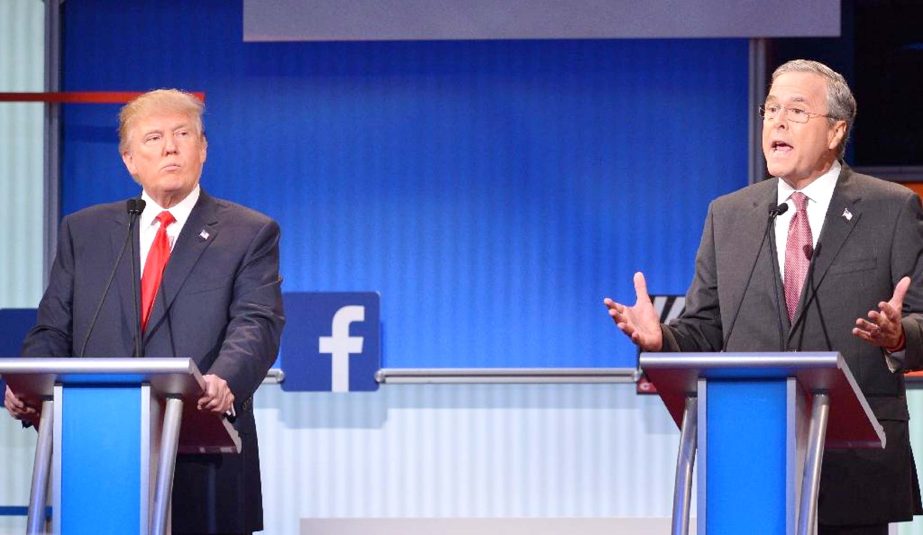
AP, Atlanta :
Republican presidential hopeful Jeb Bush said Tuesday that the government should have broad surveillance powers of Americans and private technology firms should cooperate better with intelligence agencies to help combat “evildoers.”
At a national security forum in the early voting state of South Carolina, Bush put himself at odds with Republican congressional leaders who earlier this year voted to end the National Security Agency’s bulk collection of phone records.
The former Florida governor said Congress should revisit its changes to the Patriot Act, and he dismissed concerns from civil libertarians who say the program violated citizens’ constitutionally protected privacy rights.
“There’s a place to find common ground between personal civil liberties and NSA doing its job,” Bush said. “I think the balance has actually gone the wrong way.”
Bush also said the U.S. should send more troops – he didn’t say how many – and equipment to eastern European nations in response to Russia’s increasingly aggressive posture in the region. He said Russian President Vladimir Putin should know that his “adventurism” comes with “a price to pay.”
“Rather than reacting to the bad behavior, I think we need to be more forward-leaning as it relates to what the consequences will be,” Bush said.
The remarks were part of Bush’s ongoing efforts to pitch an aggressive foreign policy as he struggles to break out of a crowded Republican presidential primary in which businessman and former television reality star Donald Trump has garnered much of the attention.
Pushing a hawkish foreign policy is a staple of Republican presidential politics. The exception is Kentucky Sen. Rand Paul, and even the libertarian-leaning senator has refused to take military action off the table as he argues for a reduced American footprint around the world.
Yet for Bush, the discussion comes with particular challenges as he tries to distance himself from former President George W. Bush, the candidate’s brother, who signed the Patriot Act into law and oversaw the 2003 invasion of Iraq.
Congress voted in June to end the bulk collection of American phone records under the Patriot Act, a controversial program that NSA contractor Edward Snowden disclosed publicly in 2013.
Republican presidential hopeful Jeb Bush said Tuesday that the government should have broad surveillance powers of Americans and private technology firms should cooperate better with intelligence agencies to help combat “evildoers.”
At a national security forum in the early voting state of South Carolina, Bush put himself at odds with Republican congressional leaders who earlier this year voted to end the National Security Agency’s bulk collection of phone records.
The former Florida governor said Congress should revisit its changes to the Patriot Act, and he dismissed concerns from civil libertarians who say the program violated citizens’ constitutionally protected privacy rights.
“There’s a place to find common ground between personal civil liberties and NSA doing its job,” Bush said. “I think the balance has actually gone the wrong way.”
Bush also said the U.S. should send more troops – he didn’t say how many – and equipment to eastern European nations in response to Russia’s increasingly aggressive posture in the region. He said Russian President Vladimir Putin should know that his “adventurism” comes with “a price to pay.”
“Rather than reacting to the bad behavior, I think we need to be more forward-leaning as it relates to what the consequences will be,” Bush said.
The remarks were part of Bush’s ongoing efforts to pitch an aggressive foreign policy as he struggles to break out of a crowded Republican presidential primary in which businessman and former television reality star Donald Trump has garnered much of the attention.
Pushing a hawkish foreign policy is a staple of Republican presidential politics. The exception is Kentucky Sen. Rand Paul, and even the libertarian-leaning senator has refused to take military action off the table as he argues for a reduced American footprint around the world.
Yet for Bush, the discussion comes with particular challenges as he tries to distance himself from former President George W. Bush, the candidate’s brother, who signed the Patriot Act into law and oversaw the 2003 invasion of Iraq.
Congress voted in June to end the bulk collection of American phone records under the Patriot Act, a controversial program that NSA contractor Edward Snowden disclosed publicly in 2013.

